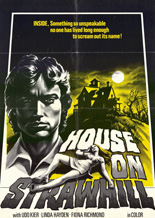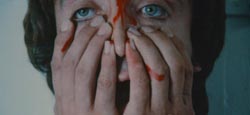
 After nailing down a cool half-mil on his debut, novelist Paul Martin (Udo Kier, Flesh for Frankenstein) is having a tough time writing his sophomore book. Even after hiding himself and his typewriter in the British countryside House on Straw Hill, he’s only slightly more productive as an author than The Shining’s Jack Torrance.
After nailing down a cool half-mil on his debut, novelist Paul Martin (Udo Kier, Flesh for Frankenstein) is having a tough time writing his sophomore book. Even after hiding himself and his typewriter in the British countryside House on Straw Hill, he’s only slightly more productive as an author than The Shining’s Jack Torrance.
With deadline looming, Paul hires a typist to whom he can dictate, and off the train pops Linda (Linda Hayden, Taste the Blood of Dracula), a pretty young thing who packs a dildo in her suitcase — not that Paul can cast much judgment, as he dons latex surgical gloves for his sexual trysts with his shapely ginger girlfriend, Suzanne (UK sex symbol Fiona Richmond, History of the World: Part I).
 Linda proves as skilled at her job as she is at self-pleasuring, which she does often throughout the picture, but having her around is not good for Paul’s fragile mental health. He keeps experiencing visions of a grisly, bloody death, sometimes during the most inopportune times (such as, say, while Suzanne writhes atop his unit like an Olympic gymnast). Just what the hell is going on?
Linda proves as skilled at her job as she is at self-pleasuring, which she does often throughout the picture, but having her around is not good for Paul’s fragile mental health. He keeps experiencing visions of a grisly, bloody death, sometimes during the most inopportune times (such as, say, while Suzanne writhes atop his unit like an Olympic gymnast). Just what the hell is going on?
Viewers will wonder, as writer/director James Kenelm Clarke (Let’s Get Laid) keeps the film’s secret under his hat for a little too long. It becomes evident once you realize how little story is at work, with a lot of sex and violence to pad it out — not for nothing did The House on Straw Hill stake a claim on the dreaded “video nasties” list in the regressive-repressive 1980s (often under its alternate title of the apt Trauma).
In exchange for sticking it out, audiences are rewarded with a sick little thriller in which Paul’s freakouts are so heavily laden with dream imagery and actions don’t always adhere to logic that one wonders if the entire film isn’t a facade of sorts. For example, what kind of woman is raped at gunpoint by two guys — one of whom sports a T-shirt reading, “I Am a Vampyre,” no less — yet able to brush off such an act as if nothing happened? You’ll get the answer, actually; note that I have not accused Clarke’s work of possessing good taste. —Rod Lott
